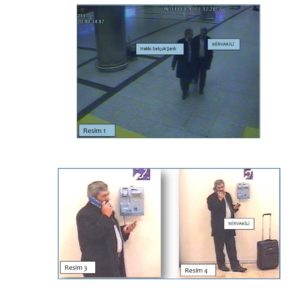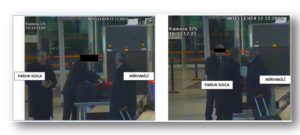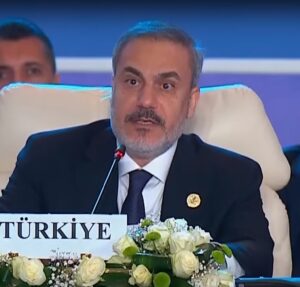Abdullah Bozkurt/Stockholm
Behnam Shahriyari, a notorious general in Iran’s Islamic Revolutionary Guard Corps (IRGC) Quds Force who once operated freely in Turkey under the protection of President Recep Tayyip Erdogan, was killed on June 21 in a precision airstrike by Israeli forces in western Iran, according to the Israeli Defense Forces (IDF). His death marks the end of a bloody chapter for a man long accused of financing and arming terrorist proxies across the Middle East.
In a post on X the IDF confirmed Shahriyari was “eliminated in a precise IDF strike in western Iran while travelling in a car.” The announcement included aerial footage of the operation.
“Shahriyari was responsible for all weapons transfers from the Iranian regime to its proxies across the Middle East in order to directly advance the Iranian regime’s plan to destroy Israel,” the IDF stated.
“Shahriyari also commanded the transfer of hundreds of millions of dollars annually to various terrorist organizations. Furthermore, he led the extensive effort to finance and arm these terrorist organizations — an effort that has resulted in the deaths and injuries of many Israeli civilians and soldiers.”
Quds Force General Behnam Shahriyari was killed in a precision strike carried out by the Israeli Defense Forces in western Iran on June 21, 2025:
Shahriyari had spent a significant amount of time in Turkey, where he helped build the Quds Force’s Turkish network, known as Tevhid Selam, operating under the alias Sayed Ali Akber Mir Vakili and claiming diplomatic status. Turkish police counterterrorism units put him under surveillance after he was caught interacting with one of his key Turkish operatives.
The Quds Force investigation in Turkey, launched in 2011 and kept confidential until February 2014, detailed Shahriyari’s extensive clandestine activities, including contacts with high-level Turkish officials. Turkish prosecutors obtained court warrants to wiretap his and his associates’ phones and conducted surveillance on their movements in Turkey.
Despite being under close watch, Shahriyari had no difficulty gaining access to top Turkish officials. He had private meetings with then-prime minister Erdogan and then-foreign minister Ahmet Davutoğlu.
Although he had been designated as a Specially Designated National (SDN) by the US Treasury Department’s Office of Foreign Assets Control (OFAC) under counterterrorism sanctions for his involvement in an IRGC-linked shipping firm that supplied weapons to Hezbollah, Turkish officials welcomed his presence. In 2011 Hakan Fidan, then-chief of Turkish intelligence agency (MIT) and now foreign minister, arranged special treatment for Shahriyari — including airport pickup, security protection and use of an MIT aircraft for his return to Tehran.
The Turkish probe eventually identified 242 Turkish and Iranian nationals as active members of the Quds Force’s Turkey-based network. However, the investigation was abruptly shut down in February 2014, before prosecutors could secure arrest warrants. The Erdogan government purged all prosecutors, police chiefs and judges involved in the investigation, effectively burying the case.

On February 2, 2024, Shahriyari and six others — including Turkish national Sıtkı Ayan, a close Erdogan associate — were indicted by the US Attorney for the Southern District of New York on charges of terrorism, sanctions evasion, fraud and money laundering. The indictment alleged the group laundered proceeds from illicit oil sales to China, Russia and Syria to fund Quds Force operations.
The US indictment reinforced findings from the earlier Turkish investigation, revealing that Shahriyari resumed operations in Turkey after escaping legal jeopardy. His network became even more vital after the US imposed new sanctions on Iran’s petroleum sector in 2018. He helped build an elaborate system of front companies in Turkey, Greece, the UAE, India, Russia, Oman and elsewhere to sell oil and smuggle the proceeds — often via bulk cash shipments or fake trade deals — back to Iran.

These funds were funneled directly into the Quds Force’s operations, aiding Iranian-backed terrorist groups including Hezbollah, Hamas and Islamic Jihad.
The Turkish investigation also exposed disturbing levels of Iranian infiltration in the upper echelons of the Turkish government. Wiretapped communications revealed that members of the Quds Force’s Turkish cell referred to Fidan as “Emin,” meaning “trusted man.” They used burner phones and rotated numbers every few months to evade surveillance.
Fidan, who was involved with pro-Iranian Shiite circles during his military career, reportedly revered IRGC Quds Force commander Qassem Soleimani as his role model.
One wiretap confirmed a covert meeting between Fidan and Shahriyari on October 23, 2013. Two days earlier, Fidan was recorded speaking with Faruk Koca, a Turkish national previously convicted of terrorism for ties to an Iranian-backed group. Without mentioning Shahriyari’s name, Fidan asked if Koca was expecting visitors from Iran. Koca confirmed Shahriyari’s imminent arrival and sought help arranging a meeting with Erdogan. Fidan agreed to assist.
Summary of the police investigation into IRGC Quds Force General Sayed Ali Akber Mir Vakili and his Turkish contacts including intelligence agency chief Hakan Fidan:
Minutes later, Koca called Shahriyari to update him, saying he had spoken to Fidan about the meeting. The following day, Fidan and Koca finalized the logistics.
The pair also enlisted Sefer Turan — Erdogan’s chief Middle East advisor and a suspect in the Quds Force probe — to coordinate further. In a wiretap from October 23 at 18:12, Turan called Koca to say he would also attend the meeting with Erdogan.
Shahriyari and his associates arrived in Turkey that same day. Fidan organized their domestic travel and assigned them a security detail to avoid detection — unaware that the police were tracking them. Officers managed to photograph Shahriyari and his team during the visit.
The meeting with Erdogan occurred on October 25, 2013, at the prime minister’s private residence in Ankara’s Keçiören district. The encounter remained secret until Erdogan inadvertently revealed it during a speech in Van the following day, referring to Shahriyari as a “friend from Iran who came yesterday” and saying they had discussed the death of Muslims in Syria.
After the meeting, Shahriyari flew back to Iran aboard a Turkish intelligence aircraft without undergoing customs or immigration checks.

Although Tevhid Selam is officially designated as a terrorist organization in Turkey and has been linked to murders, bombings and kidnappings, the Erdogan government has effectively nullified this designation. It protected operatives from the criminal justice system and shut down investigations, allowing the Quds Force to operate freely on Turkish soil.
It’s no surprise that the Erdogan government sided with Iran during its recent conflict with Israel, voicing strong support for the theocratic regime while harshly criticizing Israel over its strikes on Iran’s nuclear and military facilities.
The Erdogan government — heavily influenced by pro-Iranian figureheads and guided by political Islamist ideology — continues to show sympathy for Iran’s clerical regime, all while turning a blind eye to Tehran’s long-standing efforts to undermine Turkey’s own national security interests












